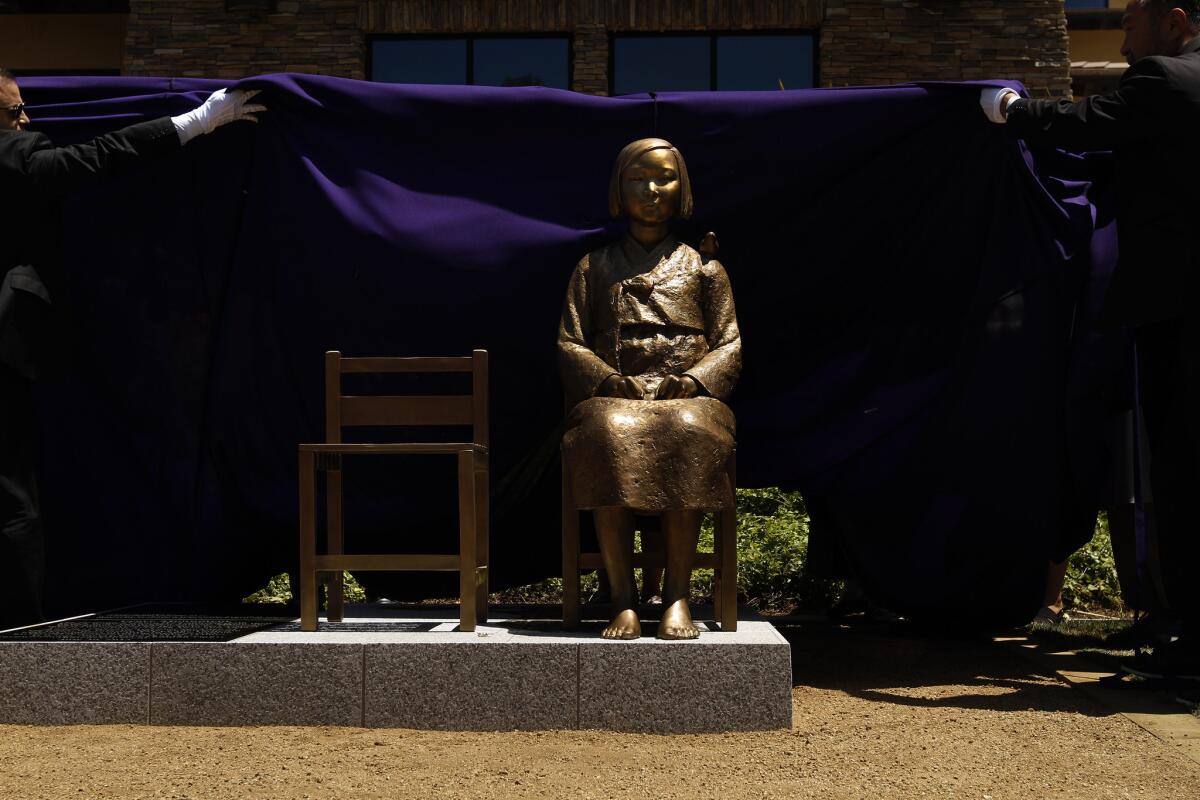Court rules in favor of Glendale memorial to ‘comfort women’

A federal appeals court has upheld the dismissal of a lawsuit against the city of Glendale that demanded removal of a memorial statue dedicated to as many as 200,000 women from Korea and other countries forced into sex slavery by Japanese soldiers during World War II.
Plaintiff Michiko Gingery filed the lawsuit objecting to the 1,100-pound bronze statue, which was erected in the city’s Central Park in 2013. The memorial depicts a girl in Korean garb sitting next to an empty chair, and it commemorates the wartime victims known as comfort women.
Gingery said it unconstitutionally disrupted the federal government’s foreign policy and relationship with Japan.
However, U.S. 9th Circuit Court of Appeals Judge Kim McLane Wardlaw, in a ruling Thursday, said Glendale’s memorial simply takes a stand against human rights violations, something well within the purview of local governments.
“Here, by dedicating a local monument to the plight of the comfort women in World War II, Glendale has joined a long list of other American cities that have likewise used public monuments to express their views on events beyond our borders,” Wardlaw wrote in her ruling.
Her decision upheld a U.S. District Court opinion.
Glendale Mayor Paula Devine said the judge’s ruling was made at an ideal time because on Friday the city will sign an agreement to establish a “sister city” relationship with the South Korean community of Boeun-gun.
Devine said she’s met with a number of surviving comfort women — who are now in their 80s and 90s — when they visited Glendale and shared their stories.
“What they went through as young girls, just kids, they still bear that pain,” she said. “No one deserves that kind of treatment. It’s very important to raise awareness so something like that never happens again.”
Glendale has one of the largest Korean American populations in California with more than 10,000 residents, according to the U.S. census.
Ronald Barak, Gingery’s attorney, did not return phone calls for a comment.
The Japanese government over the decades has denied that South Korean women were forced to work in brothels during World War II, but late last year, Prime Minister Shinzo Abe’s administration issued $8.1 million to fund a foundation to support surviving comfort women.
One caveat the Japanese required was that the South Korean government refrain from discussing the comfort women issue in the international community or at the United Nations.
Twitter: @arinmikailian
ALSO
Boyle Heights activists blame the art galleries for gentrification
Hundreds turn out to honor, mourn slain San Diego police officer
Wardens at two women’s prisons retire amid abuse, suicide claims
More to Read
Sign up for Essential California
The most important California stories and recommendations in your inbox every morning.
You may occasionally receive promotional content from the Los Angeles Times.











